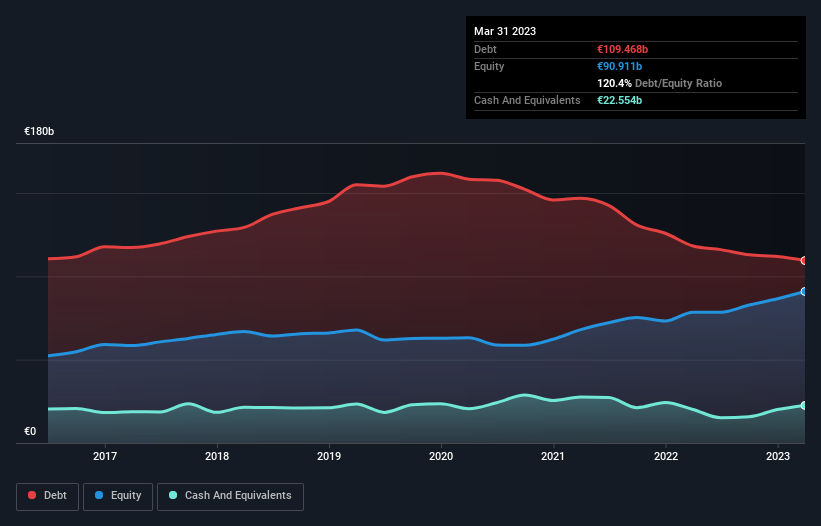Mercedes-Benz Group (ETR:MBG) Takes On Some Risk With Its Use Of Debt

Warren Buffett famously said, 'Volatility is far from synonymous with risk.' So it might be obvious that you need to consider debt, when you think about how risky any given stock is, because too much debt can sink a company. We note that Mercedes-Benz Group AG (ETR:MBG) does have debt on its balance sheet. But should shareholders be worried about its use of debt?
When Is Debt A Problem?
Generally speaking, debt only becomes a real problem when a company can't easily pay it off, either by raising capital or with its own cash flow. If things get really bad, the lenders can take control of the business. However, a more common (but still painful) scenario is that it has to raise new equity capital at a low price, thus permanently diluting shareholders. Of course, the upside of debt is that it often represents cheap capital, especially when it replaces dilution in a company with the ability to reinvest at high rates of return. When we think about a company's use of debt, we first look at cash and debt together.
See our latest analysis for Mercedes-Benz Group
What Is Mercedes-Benz Group's Debt?
The image below, which you can click on for greater detail, shows that Mercedes-Benz Group had debt of €109.5b at the end of March 2023, a reduction from €118.2b over a year. On the flip side, it has €22.6b in cash leading to net debt of about €86.9b.

A Look At Mercedes-Benz Group's Liabilities
We can see from the most recent balance sheet that Mercedes-Benz Group had liabilities of €89.5b falling due within a year, and liabilities of €82.9b due beyond that. Offsetting this, it had €22.6b in cash and €6.84b in receivables that were due within 12 months. So its liabilities outweigh the sum of its cash and (near-term) receivables by €142.9b.
This deficit casts a shadow over the €72.6b company, like a colossus towering over mere mortals. So we definitely think shareholders need to watch this one closely. At the end of the day, Mercedes-Benz Group would probably need a major re-capitalization if its creditors were to demand repayment.
In order to size up a company's debt relative to its earnings, we calculate its net debt divided by its earnings before interest, tax, depreciation, and amortization (EBITDA) and its earnings before interest and tax (EBIT) divided by its interest expense (its interest cover). Thus we consider debt relative to earnings both with and without depreciation and amortization expenses.
Mercedes-Benz Group has a debt to EBITDA ratio of 4.0, which signals significant debt, but is still pretty reasonable for most types of business. However, its interest coverage of 1k is very high, suggesting that the interest expense on the debt is currently quite low. Mercedes-Benz Group grew its EBIT by 9.9% in the last year. That's far from incredible but it is a good thing, when it comes to paying off debt. The balance sheet is clearly the area to focus on when you are analysing debt. But ultimately the future profitability of the business will decide if Mercedes-Benz Group can strengthen its balance sheet over time. So if you want to see what the professionals think, you might find this free report on analyst profit forecasts to be interesting.
But our final consideration is also important, because a company cannot pay debt with paper profits; it needs cold hard cash. So we always check how much of that EBIT is translated into free cash flow. Happily for any shareholders, Mercedes-Benz Group actually produced more free cash flow than EBIT over the last three years. That sort of strong cash generation warms our hearts like a puppy in a bumblebee suit.
Our View
While Mercedes-Benz Group's level of total liabilities has us nervous. For example, its interest cover and conversion of EBIT to free cash flow give us some confidence in its ability to manage its debt. Looking at all the angles mentioned above, it does seem to us that Mercedes-Benz Group is a somewhat risky investment as a result of its debt. Not all risk is bad, as it can boost share price returns if it pays off, but this debt risk is worth keeping in mind. The balance sheet is clearly the area to focus on when you are analysing debt. However, not all investment risk resides within the balance sheet - far from it. These risks can be hard to spot. Every company has them, and we've spotted 3 warning signs for Mercedes-Benz Group (of which 2 are potentially serious!) you should know about.
Of course, if you're the type of investor who prefers buying stocks without the burden of debt, then don't hesitate to discover our exclusive list of net cash growth stocks, today.
New: Manage All Your Stock Portfolios in One Place
We've created the ultimate portfolio companion for stock investors, and it's free.
• Connect an unlimited number of Portfolios and see your total in one currency
• Be alerted to new Warning Signs or Risks via email or mobile
• Track the Fair Value of your stocks
Have feedback on this article? Concerned about the content? Get in touch with us directly. Alternatively, email editorial-team (at) simplywallst.com.
This article by Simply Wall St is general in nature. We provide commentary based on historical data and analyst forecasts only using an unbiased methodology and our articles are not intended to be financial advice. It does not constitute a recommendation to buy or sell any stock, and does not take account of your objectives, or your financial situation. We aim to bring you long-term focused analysis driven by fundamental data. Note that our analysis may not factor in the latest price-sensitive company announcements or qualitative material. Simply Wall St has no position in any stocks mentioned.
About XTRA:MBG
Mercedes-Benz Group
Operates as an automotive company in Germany and internationally.
Established dividend payer and good value.
Similar Companies
Market Insights
Community Narratives



